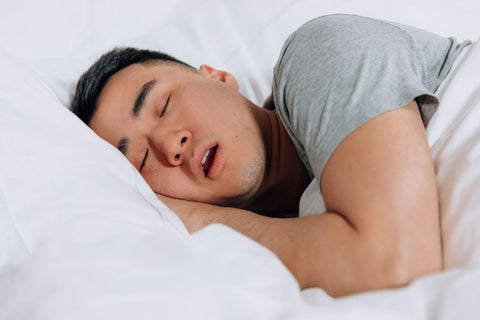Waking up with a dry mouth and throat is a familiar discomfort that we’ve all experienced from time to time.
However, when dry mouth becomes a common occurrence, it can be a serious problem.
Not only is chronic dry mouth inconvenient and uncomfortable; it’s actually a cause for concern. That’s why we’re sharing these five common causes of chronic dry mouth.
First, let’s examine why chronic dry mouth and throat are a danger to your health.
Why Chronic Dry Mouth and Throat is Cause for Concern
The main reason why chronic dry mouth and throat is harmful? A lack of saliva.
Believe it or not, your saliva keeps your mouth and teeth healthy, protecting the mouth by coating your teeth and shielding them from harmful bacteria.
With the lack of saliva associated with dry mouth, you may be faced with:
- Bad breath
- Oral hygiene challenges, such as tooth decay and gum disease
- Discomfort when speaking and/or swallowing
As the gums and teeth are left unprotected, acidity in the mouth rises. That means enamel breakdown and weakened gum tissues.

Even if you manage to avoid tooth decay and gum health challenges, your risk of sore throat or respiratory infection increases if you suffer from chronic dry mouth due to increased bacteria.
If you want to avoid oral health issues, infection, and discomfort, you must first identify what’s causing your dry mouth and throat. One main cause associated with dry mouth? Dehydration.
1. Are You Dehydrated?
It may sound like a general “fix-all” that drinking water is so vital to your health. The truth is, chronic dry mouth may be caused by something as easily preventable as dehydration.
An astounding 75 percent of Americans suffer from chronic dehydration. If you don’t drink more fluid than your body eliminates, you’re likely dehydrated.
Dry mouth is usually a signal that you’realready dehydrated. Increase your water intake to no less than 64 ounces daily and track if your dry mouth subsides.

Another good rule of thumb is to drink half of your body weight in ounces. That said, you may need more water each day depending on your health status or if you consume diuretics.
Alcohol, coffee, and tea all lead to increased production of urine, causing you to become dehydrated more rapidly. Tobacco, which reduces saliva production, can also exacerbate dry mouth and worsen dehydration.
When consuming these, be sure to up your water intake even further.
Once your water intake is under control, consider environmental factors like the weather.
2. Exposure to Low Humidity
Low humidity, high winds, or overall dry weather dry out the mucous membranes. As a result, chronic dry mouth worsens.
In the winter months, humidity decreases in some climates and the air is drier, on average. Moisture from the body tends to evaporate quicker in dry weather, leading to worsened dehydration.
Indoor temperatures and conditions may be to blame, too. During the summer months, air conditioning can be drying. During winter, constantly running heat has the same effect.

Add a humidifier to your home to add moisture back into the air, whether you’re heating or cooling. Added humidity also provides temporary relief from any outdoor conditions that cause a dry mouth and throat.
Aside from the weather and dryness of the air in your home, various health conditions may also contribute to chronic dry mouth.
3. Various Health Conditions
There are various health conditions that may dry the mouth, including Alzheimer’s or autoimmune diseases such as Sjogren's syndrome.
Other health conditions associated with dry mouth include lupus, multiple sclerosis, Crohn’s disease, and diabetes.
Extreme thirst and dry mouth are common initial symptoms of type 1 and type 2 diabetes due to increased blood sugar. If left untreated, diabetes worsens loss of fluids and lowered saliva production.
Anxiety is also often associated with dry mouth, as stress can affect the follow of saliva.

Moreover, medications that treat certain health conditions may contribute to dry mouth, such as:
- Allergy medication
- Anti-anxiety medication
- Antidepressants
- Cardiovascular drugs
- Decongestants
- Painkillers
- Smoking control medications
Consult your doctor to determine if dry mouth is a symptom of your medication.
We’ve covered how dehydration, dry air, and various health conditions or medications lead to chronic dry mouth and throat, but there’s one main contributor we have yet to discuss in detail: mouth breathing.
4. Mouth Breathing and Snoring
Plain and simple: if you breathe in and out of your mouth over your nose, you’re drying your mouth out. Mouth breathing causes the saliva in the mouth to evaporate.
Furthermore, mouth breathing dries out the nasal cavity, which increases mucus production. This worsens congestion, which increases mouth breathing.
When this becomes a habitual action, you’ll mouth breathe both day and night. That leads to an increased risk of sleep apnea, cardiovascular problems, and snoring.

As you breathe in and out of the mouth at night, the tissues in your airway fall back due to gravity. Consequently, the airway is blocked and the tissues vibrate together, producing the sound of snoring.
Over time, snoring fragments sleep, leading to extreme fatigue and activation of the sympathetic nervous system, which places the body in a stressed “fight or flight” state.
The only way to prevent this? Breathe in and out of the nose instead of the mouth.
The nose produces nitric oxide, a miracle molecule that decreases stress, improves blood circulation, lowers blood pressure, and warms, humidifies, and filters the air we breathe.
@somnifix WHY breathe through your nose? Via @Priya Mistry, DDS 🦷 #dentistsoftiktok #learnontiktok #nasalbreathing #airwayhealth #insomnia #somnifix ♬ original sound - material growl 😘💅
Switching to nasal breathing both day and night not only improves chronic dry mouth and throat; it improves your overall health, sleep, and quality of life.
If you’re a habitual mouth breather, how can you make the switch? And how do you keep nasal breathing into the night to ensure you don’t wake up with a dry mouth? Mouth tape.
5. You Don’t Tape Your Mouth at Night
As we’ve learned, mouth breathing is a huge cause of chronic dry mouth and throat. If you mouth breathe during sleep, your risk for snoring, fatigue, and health complications rise.
If you want to wake up free from chronic dry mouth and throat, you have to stop mouth breathing while you sleep. Close your mouth and breathe through your nose at rest, and you’ll wake up with a moisturized, pain-free mouth and throat.
That means no more grogginess or uncomfortable, unquenchable thirst upon waking up. As a result, your oral health, breath, and quality of life will improve.

But how do you stop mouth breathing during sleep if you’re unconscious? You have to tape your mouth shut before you go to bed.
No, we’re not kidding. Mouth taping has the ability to help you nasal breathe into the night for restful, undisturbed sleep. If you’re not mouth taping at night, you’re prolonging your suffering from dry mouth and throat.
You’re likely wondering, “should I just grab some Scotch tape and place it over my lips?” Before you reach for the first roll of tape you can find, consider that a tape made with skin in mind is best.
Put Chronic Dry Mouth and Throat to Bed With SomniFix
Now that you have identified what could be causing your chronic dry mouth, you can focus on stopping it for good.
Nasal breathing is the most efficient way to breathe. It improves our health and overall quality of life, but nasal breathing at night is a challenge for most people.
In some sleeping positions, the mouth falls open. From there, tissues fall backward and block the airway, causing snoring and fragmented sleep.

Mouth tape is the perfect solution for putting an end to chronic dry mouth and throat. But before you reach for any tape, be warned that the chemicals in the adhesives of most tapes irritate the skin.
SomniFix Mouth Strips, however, are created with hypoallergenic ingredients that are latex and gluten-free. Moreover, our strips are so comfortable you won’t even realize you’re wearing mouth tape at all.
Sleep with SomniFix and put chronic dry mouth and throat to bed for good!



